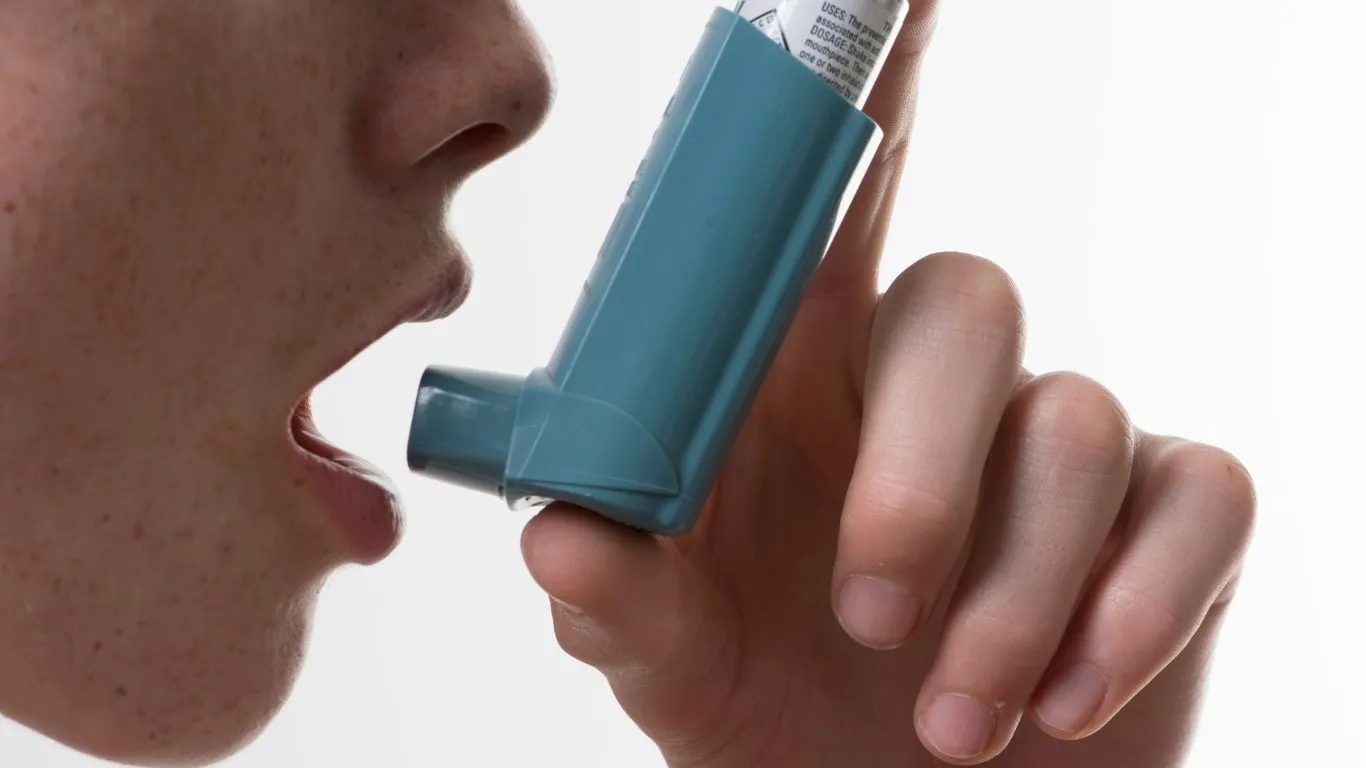Can Asthma Cause a Feeling of Fullness? Surprising Symptoms Explained
If you’ve ever found yourself wondering, can asthma cause a feeling of fullness—you’re not alone. I’ve had countless patients over the years bring up this strange, bloated sensation in their chest or upper abdomen, especially during or after an asthma flare-up. It might not be the most obvious symptom people associate with asthma, but let me tell you—it’s real, and it can be incredibly uncomfortable. As a pulmonary nurse practitioner, I’ve seen how this mysterious fullness can add another layer of frustration to an already tough condition.
Understanding Asthma Beyond the Obvious

When we talk about asthma, most people immediately think of wheezing, coughing, chest tightness, and that unmistakable shortness of breath. Those are the textbook symptoms. But asthma is more than just what you read in a pamphlet at your doctor’s office. It’s dynamic, and it varies from person to person—and sometimes, it brings symptoms that feel completely unrelated.
I remember one patient—let’s call her Denise—who came in saying she felt like there was a balloon inflating in her upper abdomen every time she had an asthma attack. Turns out, she wasn’t being dramatic or overanxious. That sensation of pressure and bloating? It can be tied to how asthma affects the diaphragm and nearby digestive organs. Denise was relieved to hear she wasn’t imagining things, and maybe you need to hear that too.
Can Asthma Cause a Feeling of Fullness? Let’s Break It Down
The short answer is yes, it can—and here’s why. When you’re struggling to breathe, your diaphragm works overtime, and your body compensates by shifting how you breathe. Instead of deep belly breathing, you might start using your accessory muscles more (hello neck and shoulders), and your posture may change without you even realizing it. That can lead to a bunch of downstream effects:
- Increased air trapping in the lungs, which can press down on the stomach and intestines.
- Swallowed air from frequent gulping or mouth breathing during episodes, leading to bloating.
- Tight diaphragm and intercostal muscles that affect your digestive motility and positioning.
So that “fullness” you’re feeling? It might not be food-related at all—it could be air, muscle tension, or pressure from inflamed lung tissue.
What It Feels Like for Real People

Let’s get real for a second. Patients don’t usually come in saying, “I have diaphragmatic compression secondary to pulmonary hyperinflation.” They say things like:
- “It feels like I ate a full Thanksgiving dinner—even when I haven’t eaten.”
- “I feel puffed up like a balloon.”
- “My chest and belly feel tight and full at the same time.”
I’ve heard all of these—and they’re valid descriptions. When you’re gasping for air, the last thing your body is prioritizing is digesting your lunch. Everything gets sluggish, including digestion, leading to that heavy, stuck sensation.
Is It All in the Gut?
That fullness can sometimes mimic or even worsen GI symptoms like reflux, indigestion, or bloating. In fact, there’s a strong link between asthma and GERD (gastroesophageal reflux disease). When the diaphragm is under pressure and the lungs are inflamed, it’s not uncommon for stomach acid to sneak back up, especially when lying down. It’s a double whammy: asthma can contribute to reflux, and reflux can trigger asthma. Vicious cycle, right?
As someone who’s managed complex asthma cases in outpatient and hospital settings, I’ve seen this connection play out over and over. The good news? Once we understand the root of the fullness, we can do something about it. Sometimes it’s a matter of adjusting medications. Sometimes it’s positioning. Sometimes, it’s diet tweaks or breathing exercises.
How Your Body Reacts Under Stress

Another factor that can’t be ignored is the role of stress. Asthma attacks can be scary. They trigger your body’s fight-or-flight response. That dumps adrenaline into your system, which can shut down your digestive tract (because who needs to digest food while being chased by a lion, right?).
- Breathing becomes shallow, upper-chest focused, and rapid.
- Digestion slows down, creating gas buildup and that “heavy” sensation.
- Muscles tighten, including those in your belly and back, adding to discomfort.
It’s not just about asthma alone—it’s how the body responds holistically. Everything is connected, and I always remind my patients: what’s going on in your lungs can absolutely ripple through your whole system, including your gut.
Breathing Patterns That May Be Making You Feel Full

Let’s talk about breathing for a second—not the kind you do automatically, but the kind you do when your lungs are in distress. Most of my patients don’t realize that during asthma flares, their breathing patterns shift dramatically. And guess what? That shift can absolutely explain why you’re feeling bloated or full.
Here’s what I often see: Instead of breathing deeply from the diaphragm (which expands your lungs fully and promotes relaxation), people with asthma start doing these quick, shallow breaths from the chest. It’s like panic breathing. This can cause a few things to happen:
- Hyperinflation of the lungs, which can push down on your stomach and intestines.
- Postural changes—like hunching over or tightening the abdomen—that compress internal organs.
- Gulping air, which leads to excess gas in the stomach, aka bloating central.
Now, when I’m assessing someone who says, “I feel full, but I haven’t eaten much,” I always check their breathing mechanics. Nine times out of ten, we find a connection. And the best part? With a few simple changes, that sensation of fullness can start to improve.
My Go-To Tips to Fix the Fullness (From Years in Practice)
Alright, here’s where the rubber meets the road. After years of working with asthma patients in clinics and hospitals, I’ve picked up a few practical tips that help with that tight, full sensation. These aren’t magic fixes, but they can definitely make a difference:
- Try pursed-lip breathing. It slows down your breathing and prevents air trapping. Just inhale through your nose and exhale slowly through pursed lips, like you’re blowing out a candle.
- Sit upright or slightly forward. Lying flat can worsen both asthma and fullness. I always tell patients: “Gravity is your friend—use it to give your lungs space.”
- Watch for carbonated drinks and gum. Anything that increases swallowed air can add to the pressure in your gut.
- Practice gentle belly breathing exercises. With coaching or a breathing therapist, this can retrain your diaphragm to do the work it’s meant to do.
One of my patients told me she felt 50% better just by adjusting her posture and doing breathing exercises regularly. It’s that simple—and powerful.
Asthma Medications and Their Surprising Side Effects

Now here’s something that often flies under the radar: asthma medications can sometimes contribute to that feeling of fullness. Surprised? You’re not alone. Most people focus on the immediate relief inhalers bring, but few realize how long-term medications (and how they’re used) can affect your gut and digestion.
Let’s break it down:
- Oral corticosteroids can cause bloating, increased appetite, and water retention. If you’ve ever been on a prednisone burst, you probably know that “puffy” feeling well.
- Beta-agonists (like albuterol) can relax smooth muscle—not just in the lungs, but throughout the GI tract—sometimes leading to slow digestion and gas buildup.
- Inhaled meds don’t usually impact digestion directly, but if you’re overusing your rescue inhaler, it might be a sign your asthma isn’t well-controlled. And poorly controlled asthma? Well, we’ve already covered how that affects the belly.
I always review my patients’ medication usage and side effects when they complain of fullness. Sometimes a simple tweak—like spacing out meds differently or adjusting the dose—makes a big difference.
When It’s Not Just Asthma

Now here’s the curveball: not all fullness in asthma patients is caused by asthma. There are a few overlapping conditions that love to show up uninvited. If you’re still asking yourself, can asthma cause a feeling of fullness, it’s worth digging into the bigger picture too.
Here are a few culprits I always keep an eye out for:
- Gastroesophageal reflux disease (GERD) – This one is huge. Reflux can mimic asthma and make asthma worse. It also causes that tight, bloated sensation, especially after meals or lying down.
- Hiatal hernia – When part of your stomach pushes up through your diaphragm, it can cause both chest tightness and upper abdominal pressure. Tricky to spot, but very treatable.
- Irritable bowel syndrome (IBS) – Asthma patients are more likely to deal with IBS, which can bring bloating, gas, and—you guessed it—fullness.
That’s why I never stop at “just asthma” when a patient complains about gut pressure. A thorough evaluation is key. You’ve got to look at the full picture to really get answers—and relief.
Quick Recap: What to Watch For
If you’re feeling that strange mix of chest tightness and fullness, here are some red flags and check-in points I usually go over with my patients:
- Are your asthma symptoms well-controlled?
- Are you using your rescue inhaler more than twice a week?
- Do you feel worse after meals, especially large ones?
- Do certain positions make it worse—like lying down?
- Do you notice belching, heartburn, or indigestion with your fullness?
If you said yes to a few of these, it’s worth having a deeper conversation with your provider. You don’t have to live with the discomfort—and you’re definitely not imagining it.
What You Can Do Today to Ease That Fullness

So now that we’ve unpacked all the ways asthma might be connected to that odd, bloated sensation, let’s get practical. What can you actually do—today—to start feeling better?
In my own practice, I always give patients a mix of science-backed solutions and real-life tips. Because let’s be honest, nobody has time for a 20-step routine when they’re short of breath and uncomfortable. Here’s what I usually recommend:
1. Get Your Asthma Under Control First
This might sound obvious, but it’s step one. If you’re constantly reaching for your rescue inhaler, having nighttime symptoms, or avoiding activities—you’re likely not fully controlled. That alone can cause your diaphragm and breathing muscles to stay in a constant state of tension, worsening that full feeling.
Talk with your provider about stepping up your controller meds if needed. Even small tweaks—like switching to a dry powder inhaler or spacing out meds differently—can help a lot.
2. Eat Smaller Meals, More Often
If asthma is causing your lungs to press down on your stomach, large meals can make everything worse. I usually suggest light, frequent meals—especially on days when asthma is flaring up. Think of your belly as limited real estate. Don’t overcrowd it when your lungs are already taking up extra space.
3. Try Positional Breathing
This is one of my favorite tricks to teach patients. Sit upright with your hands resting on your thighs, lean forward slightly, and take slow, deep breaths into your belly. This opens up space for your diaphragm to move and can relieve pressure instantly. I’ve had patients tell me this tip alone changed how they manage their bloating and breathlessness.
4. Rule Out Hidden Triggers
Remember, other conditions can sneak in and mimic asthma symptoms—or make them worse. If your “fullness” isn’t improving, your healthcare provider might look into:
- Reflux management—acid reducers, avoiding trigger foods, or even an upper GI scope
- Food intolerances—like dairy or gluten sensitivity, which often sneak under the radar
- Stomach motility issues—slow digestion can feel exactly like that trapped, heavy pressure
Getting those things sorted out may finally bring relief to symptoms you thought you had to “just live with.”
When to Call in the Specialists

If you’ve tried the basics and you’re still feeling like a balloon after every meal—or worse, even without eating—don’t brush it off. This is where I often recommend getting a pulmonologist and a GI specialist on board together. Asthma and digestive health overlap more than people think, and when both systems are struggling, it takes a team approach.
Sometimes we’ll do a lung function test (spirometry), combined with an esophageal pH study or even a CT scan if something just doesn’t feel right. And yes—it can be a bit of a process. But I’ve had more than one patient say, “I finally feel like myself again,” after we dug deeper. That’s always the goal.
Simple Daily Habits That Go a Long Way
Here are a few extra habits I personally use and recommend to my asthma patients who complain of bloating or upper body fullness:
- Stay hydrated—it helps thin mucus and improves digestion
- Limit carbonated drinks—they cause gas buildup
- Use a wedge pillow—especially if reflux or asthma symptoms worsen at night
- Do gentle stretching—cat-cow yoga or child’s pose can help relieve pressure
It’s not about big dramatic changes—it’s those little tweaks that add up and give your lungs and stomach the space they both need.
So… Can Asthma Cause a Feeling of Fullness? Yes—And You’re Not Alone
Let’s wrap this up with a bit of reassurance. If you’ve ever sat there thinking, “Can asthma cause a feeling of fullness? Am I just imagining this?”—the answer is a solid no. You’re not imagining it. And you’re definitely not the only one dealing with it.
It might be from air trapping, diaphragm tension, medication side effects, or coexisting conditions like reflux. But once you identify the cause—and tackle it with the right tools—you’ll be surprised how much better you can feel. That’s the power of connecting the dots between your lungs and your gut.
Further Reading & References
Disclaimer
This content is for informational purposes only and is not a substitute for professional medical advice, diagnosis, or treatment. Always consult your healthcare provider regarding any medical concerns or before making changes to your treatment plan. The author’s views are based on clinical experience and current medical understanding, but each patient is different, and individualized care is essential.

Bianca Nala is a compassionate Nurse Practitioner with a strong background in primary and respiratory care. As a health writer for Healthusias.com, she combines her clinical expertise with a talent for clear, relatable storytelling to help readers better understand their health. Bianca focuses on topics like asthma, COPD, chronic cough, and overall lung health, aiming to simplify complex medical topics without losing accuracy. Whether she’s treating patients or writing articles, Bianca is driven by a single goal: making quality healthcare knowledge accessible to everyone.







